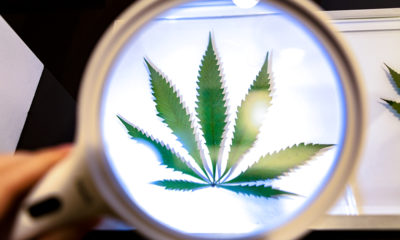
Medical
Arizona’s Flip-Flopping Stance on Marijuana and PTSD
It’s been a great year for supporters of cannabis decriminalization. Both Colorado and Washington began selling recreational marijuana, each with its own rules and regulations. In addition, pro-cannabis groups throughout the U.S. have been gaining ground and marijuana awareness is at an all-time high.
The environment makes it difficult for border states in the southern U.S., which have traditionally fought the hardest in the drug wars, to make progressive moves. This has been especially highlighted in Arizona, where the stigmatized lawman Sheriff Joe Arpaio made a name for himself butting heads with Mexican drug cartels, and the University of Arizona became a battleground for the right to use cannabis to treat PTSD in soldiers.
The PTSD Study That Couldn’t
When Suzanne Sisley gained approval from the federal government to study marijuana’s positive effects on PTSD in March, it was the first time anyone had received approval to study the positive effects of THC and CBD, much less any other illicit drug. However, as the national media applauded the decision, Arizona State Senator Kimberly Yee blocked the study.
Senator Yee’s move sparked outrage in the Arizona pot community and soon various groups, including a few veterans’ groups, were calling for her to resign. The battle went to court and in early June, Arizona Judge Thomas Shedden issued his ruling that “a preponderance of evidence shows medical marijuana provides palliative benefit to those suffering from PTSD.”
The Almost Legislation
This put the ball in the court of Will Humble, the director of the Arizona Department of Health Services. Humble was given until July 9 to either accept or appeal Judge Shedden’s decision. He begrudgingly accepted, albeit with a slight stipulation that left Attorney Ken Sobol of the Arizona Cannabis Nurses Association so upset that he filed a lawsuit earlier this month.
Starting Jan. 1, 2015, Arizona residents can purchase medical marijuana for the treatment of symptoms of PTSD. To be clear on this slight wording discrepancy, Humble stated PTSD itself can’t be treated with medicinal marijuana, however, symptoms caused by the PTSD (including anxiety, depression, etc.) can be.
The Cost of Progress
Public pressure appears to have swayed Arizona officials, but critics were left with a bitter taste from the consolation decision and wondered why the study was blocked in the first place. In fact, not only was the study terminated, so was Sisley, whose contract at the university wasn’t renewed.
Sisley publically stated that she lost her job because of the study, although both school and state government officials deny such allegations. Sisley and her team at the university spent over 8 years pioneering research on PTSD and the medicinal applications of marijuana.
Whether or not Sisley pursues action, and to what ends, remains to be seen. Still, because of her actions, Arizona joins nine states that allow medical marijuana for PTSD, including Connecticut, Delaware, Maine, New Mexico, Oregon, Michigan and Nevada.
The State of MMJ in AZ
Despite the obstacles and setbacks, marijuana usage continues to gain social acceptance in Arizona and throughout the Southwest. The state is offering discounts to veterans and seniors who are prescribed the herb. Even people on probation have been cleared to use medicinal marijuana with a doctor’s recommendation.
Neighboring state Nevada announced a proposed deal that would allow Arizona medical marijuana patients to use their cards for purchases at Nevada’s medical dispensaries when they open for business. Details are still yet to be ironed out, as Arizona officials say their systems are not yet set up to accommodate POS networks in Nevada.
Arizona may not be the most progressive state in the union and marijuana may always be a stigmatizing issue in border states, where the drug war is a part of everyday life. Support for decriminalization, however, continues to rise among the state’s constituents. One day it maybe legal to roll a blunt in the Arizona desert without ending up wearing pink boxers in Sheriff Joe’s world famous Tent City.
How do you think Arizona’s actions are affecting their residents and patients? Share your thoughts with us below.






















